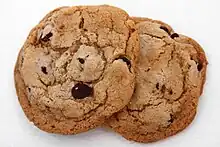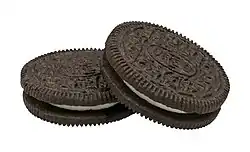cookie
English



Pronunciation
Etymology 1
Borrowed from Dutch koekie, dialectal diminutive of koek (“cake”), from Proto-Germanic *kōkô (compare German Low German Kookje (“biscuit, cookie, cracker”), Low German Kook (“cake”), German Kuchen (“cake”)). More at cake. Not related to English cook.
The computing senses derive from magic cookie.
Noun
cookie (plural cookies)
- (Canada, US) A small, flat, baked good which is either crisp or soft but firm.
- (UK, Commonwealth) A sweet baked good (as in the previous sense) usually having chocolate chips, fruit, nuts, etc. baked into it.
- (Scotland) A bun.
- (computing, Internet) An HTTP cookie.
- (computing) A magic cookie.
- (slang, dated) An attractive young woman.
- (slang, vulgar) The vulva.
- 2010, Lennie Ross, Blow me, Lulu.com, published 2010, →ISBN, page 47:
- If she wanted to compete in this dog-eat-pussy world, she had to keep up her personal grooming, even if it meant spreading her legs and letting some Vietnamese woman rip the hair off her cookie every other week.
- 2014, Nicki Minaj, "Anaconda" (Clean Version), The Pinkprint:
- Cookie put his butt to sleep, now he callin' me Nyquil.
- (slang, drugs) A piece of crack cocaine, larger than a rock, and often in the shape of a cookie.
- (informal, in the plural) One's eaten food (e.g. lunch, etc.), especially one's stomach contents.
- I lost my cookies after that roller coaster ride.
- I feel sick, like I'm about to toss my cookies.
- (informal) Clipping of fortune cookie.
- (Northern US) A doughnut; a peel-out or skid mark in the shape of a circle.
Usage notes
- In North America, a biscuit is a small, soft baked bread similar to a scone but not sweet. In some cases, it can be hard (see dog biscuit). In the United Kingdom, a biscuit is a small, crisp or firm, sweet baked good — the sort of thing which in North America is called a cookie. (Less frequently, British speakers refer to crackers as biscuits.) In North America, even small, layered baked sweets like Oreos are referred to as cookies, while in the UK, typically only those biscuits which have chocolate chips, nuts, fruit, or other things baked into them are also called cookies.
- Throughout the English-speaking world, thin, crispy, salty or savoury baked breads like in this image (saltine crackers) are called crackers, while thin, crispy, sweet baked goods like in this image (Nilla Wafers) and this image (wafer sticks) are wafers.
- Both the US and the UK distinguish crackers, wafers and cookies/biscuits from cakes: the former are generally hard or crisp and become soft when stale, while the latter is generally soft or moist and becomes hard when stale.
Hyponyms
- first-party cookie
- persistent cookie
- session cookie
- third-party cookie
Derived terms
- ally cookie
- Catherine wheel cookie
- chookie
- cookie butter
- cookie-cutter
- cookie cutter
- cookie cutterish
- cookie-cutterish
- cookie dough
- cookie exchange
- cookie grabber
- cookie hole
- cookieish
- cookie jar
- cookie-jar accounting
- cookie-jar reserve
- cookielike
- cookie-pop
- cookie pop
- cookie press
- cookie pusher
- cookie sandwich
- cookie sheet
- cookie-shine
- cookie stealer
- cookie swap
- cookie wall
- credit cookie
- eat cookie
- Empire cookie
- fingers in the cookie jar
- good cookie
- Imperial cookie
- Linzer cookie
- lose one's cookies
- ookie cookie
- Oreo cookie
- sandwich cookie
- spritz cookie
- supercookie
- that's how the cookie crumbles
- that's the way the cookie crumbles
- Toll House cookie
- tollhouse cookie
- toss one's cookies
- what do you want, a cookie
- you want a cookie
Descendants
- → Arabic: كُوكِي (kuki)
- → Cantonese: 曲奇 (kuk1 kei4)
- → Mandarin: 曲奇 (qūqí)
- → Catalan: cookie
- → Cebuano: kokis
- → French: cookie
- → Georgian: ქუქი (kuki)
- → German: Cookie
- → Gujarati: કૂકી (kūkī)
- → Hindi: कुकी (kukī)
- → Italian: cookie
- → Japanese: クッキー (kukkī)
- → Kannada: ಕುಕಿ (kuki)
- → Korean: 쿠키 (kuki)
- → Malay: kuki
- → Polish: cookie
- → Portuguese: cookie
- → Russian: куки (kuki)
- → Spanish: cookie
- → Swedish: cookie
- → Tagalog: kuki
- → Telugu: కుకీ (kukī)
- → Thai: คุกกี้ (kúk-gîi)
Translations
|
Verb
cookie (third-person singular simple present cookies, present participle cookieing or cookying, simple past and past participle cookied)
See also
- cracker (UK)
Further reading
 cookie on Wikipedia.Wikipedia
cookie on Wikipedia.Wikipedia  magic cookie on Wikipedia.Wikipedia
magic cookie on Wikipedia.Wikipedia  HTTP cookie on Wikipedia.Wikipedia
HTTP cookie on Wikipedia.Wikipedia
Noun
cookie (plural cookies)
- (dated, colloquial) Affectionate name for a cook.
- 1954, Blackwood's Magazine, volumes 275-276, page 340:
- More than a little apprehensive myself, I went out to the kitchen. Cookie, deep in a murder story, rocked peacefully beside the glowing range.
- 1988, Roald Dahl, Matilda:
- "You must show cookie here how grateful you are for all the trouble she's taken."
The boy didn't move.
"Go on, get on with it," the Trunchbull said. "Cut a slice and taste it. We haven't got all day."
Etymology 3
Corruption of cucoloris.
Catalan
References
Dutch
Pronunciation
- IPA(key): /ˈkuki/
Audio (file) - Hyphenation: coo‧kie
French
Pronunciation
- IPA(key): /ku.ki/
Audio (file)
Polish
Pronunciation
- IPA(key): /ˈku.ki/
Audio (file) - Rhymes: -uki
- Syllabification: coo‧kie
Noun
cookie n (indeclinable)
- (Internet) cookie, HTTP cookie (packet of information sent by a server to browser)
- Synonym: ciasteczko
Further reading
- cookie in Polish dictionaries at PWN
Portuguese
Spanish
Pronunciation
- IPA(key): /ˈkuki/ [ˈku.ki]
- Rhymes: -uki
Usage notes
According to Royal Spanish Academy (RAE) prescriptions, unadapted foreign words should be written in italics in a text printed in roman type, and vice versa, and in quotation marks in a manuscript text or when italics are not available. In practice, this RAE prescription is not always followed.